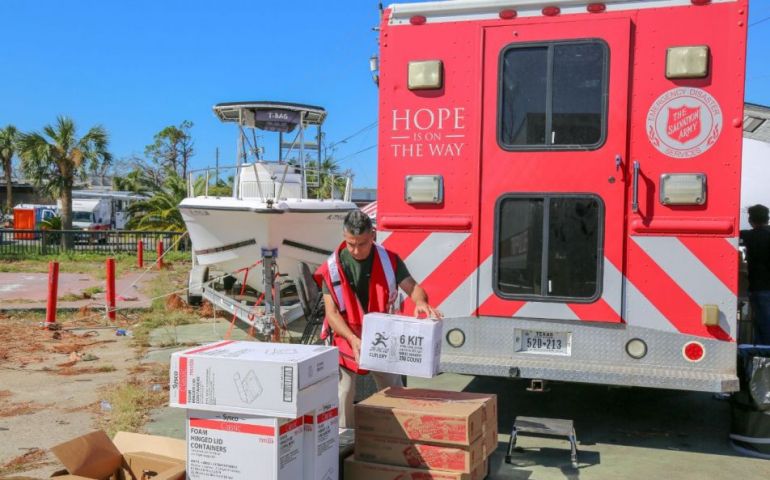Transitioning from Response to Recovery After Hurricane Michael in Panama City
Jeffrey Jellets | jeff.jellets@uss.salvationarmy.org

Panama City, FL – Since Hurricane Michael made landfall along the Florida Gulf coast on October 10, Salvation Army disaster teams have been mobilized, providing emergency relief to disaster survivors and rescue workers. As the holiday season nears, The Salvation Army in Panama City is transitioning from response operations and beginning recovery programs.
“There is still plenty of work to be done,” said Major Otis Childs, commanding officer of The Salvation Army in Panama City. “All you have to do is drive through Bay and Gulf counties to see that damage is still readily apparent. But The Salvation Army has been serving this community since 1936. We are not going anywhere.”
With the final day of mass feeding taking place on Sunday, November 18, The Salvation Army will be focused on supporting the recovery process. The Salvation Army will continue to distribute emergency commodities -- ranging from food to hygiene products to cleaning supplies – from its warehouse in Panama City. These commodities will be shared with community partners, such as schools, churches and community organizations for distribution to disaster survivors.
The Salvation Army will also be providing emergency assistance to families to help them meet critical needs. “We have always helped families during the holidays,” Childs continued. “Hurricane Michael might have forced us to change some of our traditional Christmas activities, but we will be providing disaster and holiday assistance to those who need help. We need to make this season brighter for those impacted by Hurricane Michael.”
At the height of the relief operations, The Salvation Army deployed 75 mobile feeding units and two 54’ field kitchens to provide food to communities in Florida and Georgia impacted by Hurricane Michael. Working with partners such as Operation BBQ Relief and Southern Baptist Disaster Relief, The Salvation Army has distributed more than 750,000 meals, 380,000 drinks, and 520,000 snacks. Working with Therapy Dogs International, Salvation Army emotional and spiritual caregivers provided support to more than 47,000 people. More than 20,000 food boxes, 6,000 clean-up kits, and 20,000 hygiene kits have been distributed with trained Salvation Army disaster workers and local volunteers giving more than 180,000 hours of disaster relief service to date.
About The Salvation ArmyThe Salvation Army annually helps more than 30 million Americans overcome poverty, addiction, and economic hardships through a range of social services. By providing food for the hungry, emergency relief for disaster survivors, rehabilitation for those suffering from drug and alcohol abuse, and clothing and shelter for people in need, The Salvation Army is doing the most good at 7,600 centers of operation around the country. In the first-ever listing of “America’s Favorite Charities” by The Chronicle of Philanthropy, The Salvation Army ranked as the country’s largest privately funded, direct-service nonprofit. For more information, visit www.SalvationArmyUSA.org. Follow us on Twitter @SalvationArmyUS and #DoingTheMostGood.